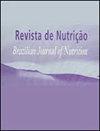对多发性硬化症患者及其家属进行营养教育对其饮食质量及人体测量和生化指标的影响
IF 0.5
4区 医学
Q4 NUTRITION & DIETETICS
Revista De Nutricao-brazilian Journal of Nutrition
Pub Date : 2022-01-01
DOI:10.1590/1678-9865202235e220153
引用次数: 0
摘要
摘要目的:本研究旨在探讨对多发性硬化症患者及其家属进行营养教育对其人体测量、生化指标及饮食质量的影响。方法:对51例多发性硬化症患者的资料进行分析。本研究分为三组。教育组仅由多发性硬化症患者组成,家庭教育组由多发性硬化症患者和与他们一起生活的家庭成员组成,对照组由未接受过教育的多发性硬化症患者组成。在教育前(T1)、教育后(T2)和教育后3个月(T3)分别进行人体测量、生化测量和饮食质量评估。结果:家庭教育组饮食质量评分分布在T3时较T1由“差”向“需要改善”显著增加。女性对照组的上臂中围在T2和T3时减小[从29.0 (23-34)cm降至28.0 (22-31)cm和27.5 (22-31)cm]。家庭教育组妇女在T2和T3时血清血红蛋白和红细胞压积水平均高于对照组。在随访中,家庭教育组男性丙氨酸转氨酶水平低于教育组。教育组患者T1、T2、T3总胆固醇、低密度脂蛋白胆固醇水平均高于对照组。结论:本研究提示营养教育对多发性硬化症患者的一些生化和人体测量指标有影响。与家人一起接受教育,饮食质量提高。本文章由计算机程序翻译,如有差异,请以英文原文为准。
Effects of nutrition education given to persons with multiple sclerosis and their families on diet quality and anthropometric and biochemical measurements
ABSTRACT Objective: In this study, it was aimed to investigate the effects of nutrition education given to persons with multiple sclerosis and their families on anthropometric and biochemical measurements and diet quality. Methods: Data from 51 persons with multiple sclerosis were analysed in this intervention study. The study was conducted with 3 groups. The education group consisted of only persons with multiple sclerosis, the family education group consisted of persons with multiple sclerosis and a family member living with them, and the control group consisted of persons with multiple sclerosis who had not received an education. Anthropometric and biochemical measurements and dietary quality assessments were made before (T1) and immediately after education (T2) and also 3 months after education (follow-up, T3). Results: The distribution of family education group diet quality scores showed a significant increase from “poor” to “needs improvement” at T3 compared to T1. The upper middle arm circumference measurements of the female control group were decreased at T2 and T3 [from 29.0 (23-34) cm to 28.0 (22-31) cm and to 27.5 (22-31) cm]. Women in family education group, levels of serum haemoglobin and haematocrit were higher than in control group at T2 and T3. Also, men in family education group, levels of alanine aminotransferase were lower than those in education group at follow up. Levels of total cholesterol and low-density lipoprotein cholesterol in education group were higher than those control group at T1, T2, and T3. Conclusion: This study indicates that nutrition education affects some biochemical and anthropometric measurements in persons with multiple sclerosis. Diet quality improved when receiving education together with families.
求助全文
通过发布文献求助,成功后即可免费获取论文全文。
去求助
来源期刊
CiteScore
1.20
自引率
12.50%
发文量
24
审稿时长
6-12 weeks
期刊介绍:
Revista de Nutrição is former Revista de Nutrição da Puccamp, founded in 1988. It is a bimonthly publication every four months and it is of responsibility of the Centro de Ciências da Vida, da Pontifícia Universidade Católica de Campinas . It publishes articles that contribute to the study of Nutrition in its many sub-areas and interfaces; and is open to contributions of the national and international scientific communities.

 求助内容:
求助内容: 应助结果提醒方式:
应助结果提醒方式:


